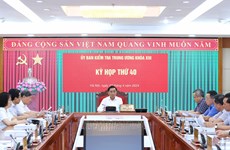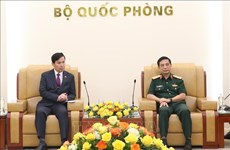Chinese Vice President set to visit Vietnam
Chinese Vice President Xi Jinbing will pay an official visit to Vietnam from Dec. 20-22.
Chinese Vice President Xi Jinbing will pay an official visit to Vietnam from Dec. 20-22.
The visit by Vice President Xi Jinbing, who is also a permanent Politburo member of the Communist Party of China Central Committee (CPCCC), is to be made at the invitation of the Communist Party of Vietnam Central Committee (CPVCC) and his Vietnamese counterpart Nguyen Thi Doan.
The visit is to take place in the context of positive developments in the two countries’ relations after Party General Secretary Nguyen Phu Trong’s official visit to China .
Since the two countries normalised their relations in 1991, the Vietnam-China friendship and cooperation have developed rapidly and deeply in all fields, bringing practical benefits to both sides.
Vietnam and China have signed many government agreements and other cooperative documents, laying a legal foundation for long-term cooperation between the two countries.
Meetings of the two countries’ leaders have been maintained, with the visits by more than 70 high-ranking delegations (from Politburo member level upwards) during the past 20 years and more than 200 delegations at all levels each year.
During Party General Secretary Le Kha Phieu’s visit to China in February 1999, the two countries’ leaders defined the motto of “friendly neighbourliness, comprehensive cooperation, long-term stability, looking toward the future” to promote bilateral relations in the 21 st century. The two sides also agreed to implement the spirit of “good neighbours, good friends, good comrades, good partners”.
In particular, during Party General Secretary Nong Duc Manh’s visit to China in May 2008, both sides were unanimous in developing the Vietnam-China comprehensive strategic cooperative partnership and agreed to set up hot-line talks between the two countries’ leaders, to lay a foundation for long-term and sustainable development of bilateral ties.
Cooperation between the two parties has also been strengthened. Since the end of 2007, China has helped train high-ranking and middle-ranking Vietnamese cadres. In 2008, the Commissions for Popularisation and Education and External Relations of the CPVCC and the Publicity and International Liaison Departments of the CPCCC signed agreements on cooperative mechanism. During Party General Secretary Nguyen Phu Trong’s visit to China from October 11-15, 2011, the two countries signed the two Parties’ cooperative plan for the 2011-2015 period.
Cooperative ties between the two countries’ key sectors, including diplomacy, security and defence sectors, have been consolidated, with the signing of cooperative agreements between the two foreign ministries in Dec. 2002, public security ministries in Sept. 2003, national defence ministries (October 2003) and the two security sectors in March 2005. The two countries signed an agreement on border guard cooperation in August 2007, a cooperative agreement between the Politics General Departments of the two defence ministries in December 2007 and an agreement on cooperation in fighting human trafficking in 2010.
The relationship between the two countries’ localities has also been enhanced in various and practical forms with the exchange of delegations at all levels and the signing of cooperative documents and the organisation of seminars and exhibitions. Over recent years, many leaders of Chinese localities, including Yunnan , Guangxi , Guangdong , Tianjin , Hainan , Shanxi and Sichuan provinces have visited Vietnam . Vietnamese local authorities have also visited Chinese localities.
The exchange between the two countries’ people and young generations has been boosted with activities like the Youth Festival, the People’s Forum and Vietnam-China Friendship Festival for People along the border.
Since the two countries normalised their relations 20 years ago, trade relations have recorded outstanding development, with two-way trade rising from 32 million USD in 1992 to 30 billion USD in 2010. China has been Vietnam ’s leading trade partner since 2004. As of the end of October 2011, two-way trade reached 28.14 billion USD, of which 8.56 billion USD came from exports and almost 20 billion USD from imports.
The two countries’ investment relations saw new developments, with many major Chinese conglomerates wishing to invest in Vietnam . By the end of October 2011, China had 808 investment projects in Vietnam with a combined registered capital of 4.2 billion USD, ranking 14 th among 93 countries and territories investing in Vietnam .
China has so far provided around 1.4 billion USD in preferential loans to Vietnam . The two countries have implemented a number of major economic projects. In addition, the Chinese Government has granted around 300 million Chinese yuan in non-refundable aid to Vietnam through organising fact-finding tours to explore China ’s socio-economic development experiences, youth exchanges, equipping Vietnam ’s hospitals, and building dormitories at Ho Chi Minh National Politics Institute and Vietnam-China Friendship Palace .
Furthermore, the Vietnam-China cooperation in education, culture, sports and tourism has also been accelerated. Every year, China grants around 130 scholarships to Vietnam . At present, there are around 13,000 Vietnamese students studying at China ’s universities. Besides, China pledged to train 1,000 students at doctorate level for Vietnam until 2020.
Chinese Vice President Xi Jinbing’s visit to Vietnam is significant in further consolidating and developing the friendly neighbouring relationship and comprehensive cooperation between the two Parties, States and peoples and solidifing the common perception that the two countries’ leaders reached during Party General Secretary Nguyen Phu Trong’s visit to China and recent high-level meetings.
On this occasion, the two countries’ leaders will discuss measures to deepen the Vietnam-China comprehensive strategic cooperative partnership and consider the signing of a number of cooperative documents./.
The visit by Vice President Xi Jinbing, who is also a permanent Politburo member of the Communist Party of China Central Committee (CPCCC), is to be made at the invitation of the Communist Party of Vietnam Central Committee (CPVCC) and his Vietnamese counterpart Nguyen Thi Doan.
The visit is to take place in the context of positive developments in the two countries’ relations after Party General Secretary Nguyen Phu Trong’s official visit to China .
Since the two countries normalised their relations in 1991, the Vietnam-China friendship and cooperation have developed rapidly and deeply in all fields, bringing practical benefits to both sides.
Vietnam and China have signed many government agreements and other cooperative documents, laying a legal foundation for long-term cooperation between the two countries.
Meetings of the two countries’ leaders have been maintained, with the visits by more than 70 high-ranking delegations (from Politburo member level upwards) during the past 20 years and more than 200 delegations at all levels each year.
During Party General Secretary Le Kha Phieu’s visit to China in February 1999, the two countries’ leaders defined the motto of “friendly neighbourliness, comprehensive cooperation, long-term stability, looking toward the future” to promote bilateral relations in the 21 st century. The two sides also agreed to implement the spirit of “good neighbours, good friends, good comrades, good partners”.
In particular, during Party General Secretary Nong Duc Manh’s visit to China in May 2008, both sides were unanimous in developing the Vietnam-China comprehensive strategic cooperative partnership and agreed to set up hot-line talks between the two countries’ leaders, to lay a foundation for long-term and sustainable development of bilateral ties.
Cooperation between the two parties has also been strengthened. Since the end of 2007, China has helped train high-ranking and middle-ranking Vietnamese cadres. In 2008, the Commissions for Popularisation and Education and External Relations of the CPVCC and the Publicity and International Liaison Departments of the CPCCC signed agreements on cooperative mechanism. During Party General Secretary Nguyen Phu Trong’s visit to China from October 11-15, 2011, the two countries signed the two Parties’ cooperative plan for the 2011-2015 period.
Cooperative ties between the two countries’ key sectors, including diplomacy, security and defence sectors, have been consolidated, with the signing of cooperative agreements between the two foreign ministries in Dec. 2002, public security ministries in Sept. 2003, national defence ministries (October 2003) and the two security sectors in March 2005. The two countries signed an agreement on border guard cooperation in August 2007, a cooperative agreement between the Politics General Departments of the two defence ministries in December 2007 and an agreement on cooperation in fighting human trafficking in 2010.
The relationship between the two countries’ localities has also been enhanced in various and practical forms with the exchange of delegations at all levels and the signing of cooperative documents and the organisation of seminars and exhibitions. Over recent years, many leaders of Chinese localities, including Yunnan , Guangxi , Guangdong , Tianjin , Hainan , Shanxi and Sichuan provinces have visited Vietnam . Vietnamese local authorities have also visited Chinese localities.
The exchange between the two countries’ people and young generations has been boosted with activities like the Youth Festival, the People’s Forum and Vietnam-China Friendship Festival for People along the border.
Since the two countries normalised their relations 20 years ago, trade relations have recorded outstanding development, with two-way trade rising from 32 million USD in 1992 to 30 billion USD in 2010. China has been Vietnam ’s leading trade partner since 2004. As of the end of October 2011, two-way trade reached 28.14 billion USD, of which 8.56 billion USD came from exports and almost 20 billion USD from imports.
The two countries’ investment relations saw new developments, with many major Chinese conglomerates wishing to invest in Vietnam . By the end of October 2011, China had 808 investment projects in Vietnam with a combined registered capital of 4.2 billion USD, ranking 14 th among 93 countries and territories investing in Vietnam .
China has so far provided around 1.4 billion USD in preferential loans to Vietnam . The two countries have implemented a number of major economic projects. In addition, the Chinese Government has granted around 300 million Chinese yuan in non-refundable aid to Vietnam through organising fact-finding tours to explore China ’s socio-economic development experiences, youth exchanges, equipping Vietnam ’s hospitals, and building dormitories at Ho Chi Minh National Politics Institute and Vietnam-China Friendship Palace .
Furthermore, the Vietnam-China cooperation in education, culture, sports and tourism has also been accelerated. Every year, China grants around 130 scholarships to Vietnam . At present, there are around 13,000 Vietnamese students studying at China ’s universities. Besides, China pledged to train 1,000 students at doctorate level for Vietnam until 2020.
Chinese Vice President Xi Jinbing’s visit to Vietnam is significant in further consolidating and developing the friendly neighbouring relationship and comprehensive cooperation between the two Parties, States and peoples and solidifing the common perception that the two countries’ leaders reached during Party General Secretary Nguyen Phu Trong’s visit to China and recent high-level meetings.
On this occasion, the two countries’ leaders will discuss measures to deepen the Vietnam-China comprehensive strategic cooperative partnership and consider the signing of a number of cooperative documents./.













